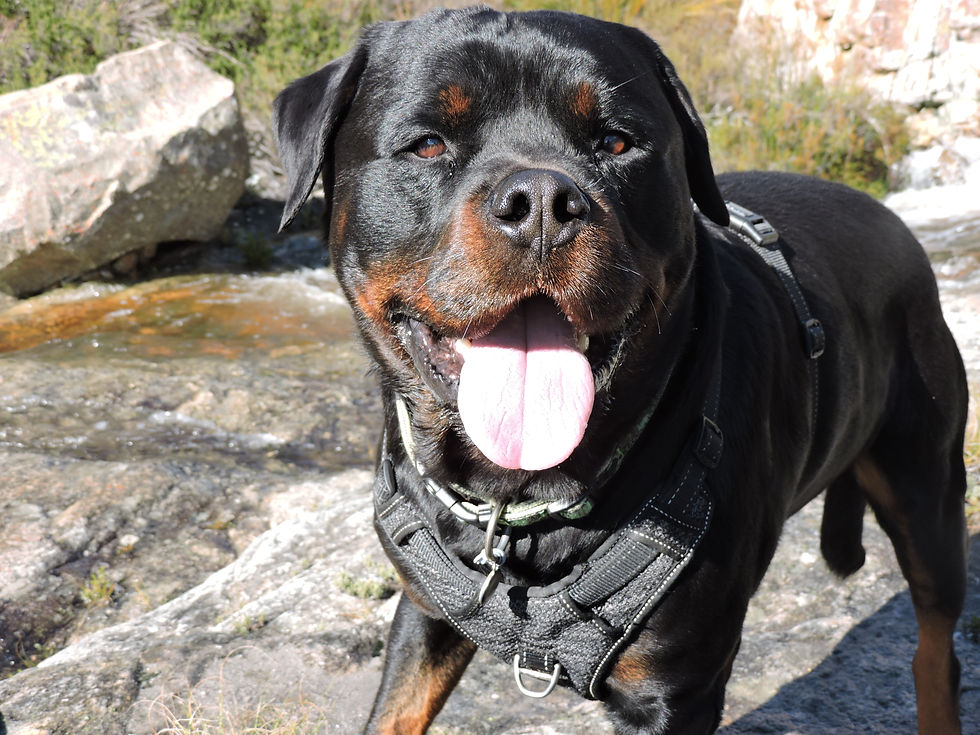Learning to listen
- Taryn
- Aug 5, 2019
- 4 min read

We are all learning all the time and our dogs can be great teachers if we are willing to listen.
A while ago, Cruz ran into a sand dune at full speed and injured his shoulder – just a soft tissue injury, but being the high-energy dog that he is, he hid it well and ended up needing physio. So, sitting and being fiddled with, prodded, manipulated and massaged became a regular part of his life over the last 8 months.
Cruz’s physiotherapist is wonderful and we are very grateful for her absolutely top-notch, expert treatment. This journey with Cruz has taught me a few things that I kind of thought I knew, but which I possibly needed to be reminded of: Listening to your dog always pays off!
Cruz is an incredibly easy-going dog from a handling point of view. In his 5 ½ years he has never so much as growled or given a cross look at anybody for touching him in any way. I have accidentally stood on him and had to nurse an open wound on his toe which was clearly painful, yet his only response when clearly uncomfortable has been a little whimper or looking very sad and wanting to move away. It just has never occurred to him to use aggression to deal with such situations and for that I am extremely grateful.
However, it is very easy to take advantage of a dog with Cruz’s nature. If he shows a little discomfort, it is tempting to just keep going with what you are doing, because he just doesn’t “get cross” and you know you can get away with a lot more. Due to the nature of his injury, Cruz needed long physio sessions to get through all the layers of muscle to the underlying problem. The first session was all new to him, so he sat through it quite unaware of what it was all about and just focusing on all the treats he was getting. However, by the second session, he obviously knew the drill and was actually not all that keen on being fiddled with and having to sit still for so long, especially when some of the manipulation was quite invasive and he was very tender. Cruz started to increasingly want to get up and walk away – and not come back! I could see he was avoiding the situation more and more and even starting to lose interest in the treats.
Now, we probably could have pushed him. If I had told him to stay or we had held them there, he probably would have given in. It is extremely unlikely that he would have actively objected – even his physio remarked that he is the kind of dog it is tempting to just soldier on with – because you kind of know you’re pretty safe and you just want to get the job done. But we didn’t do that.
Instead we took a step back and looked at what Cruz was telling us. He was telling us that the session was too long, he was telling us that it was uncomfortable and he was telling us that he wanted it to stop. The most important aspect of this, was that he was telling us all of this incredibly politely and gently. He was telling us this in the best and safest way a dog can. So, we looked at how we could make changes, not so that Cruz would know he had no choice and should just give in, but so that he knew we were listening, heard what he was saying and would give him choice so that he did not need to try any other strategy to get our attention. We did the following:
1. We broke the sessions down into short bits with good breaks in between 2. We worked outdoors where Cruz was free to walk around and sniff during his breaks 3. We looked carefully for signs of discomfort or tiredness (a lot of it was just fatigue from sitting for so long – the position necessary for much of the physio in this case) and made sure we stopped BEFORE Cruz felt the need to walk away. 4. I upped the value and variety of treats 5. I focused on training him (keeping his mind occupied) during the sessions, rather than just feeding. Being able to “work” and so in a sense, actively participate in the sessions, helped Cruz feel more in control (nose target, chin target, wait there, rest etc).
Cruz’s last session last week really showed me how far he has come. He appeared relaxed throughout the entire session and only needed one break (as opposed to 5 or 6 before). Increasingly, I had noticed that during breaks he would start voluntarily coming back for more and not even wanting to get up and move away when a break was offered! And he actually gets happily excited when he sees where we are going!
Dog bites rarely come out of the blue. Most occur because all other stress signals or polite requests for space or for something to stop have been ignored. Humans are not good at paying attention to polite requests from our dogs. Unfortunately, we seem to only notice aggression. And that is why dogs end up being forced to use it. Cruz is a very gentle and non-reactive dog – I am grateful everyday for his temperament. But I am extremely mindful that he is a dog and, like all dogs, if his current strategies don’t work, it would be completely normal for him to switch to a more effective one. For his sake, I don’t ever want that to happen, so I will continue to do my best to listen to his gentle requests, so that he doesn’t ever need to change.





Comments